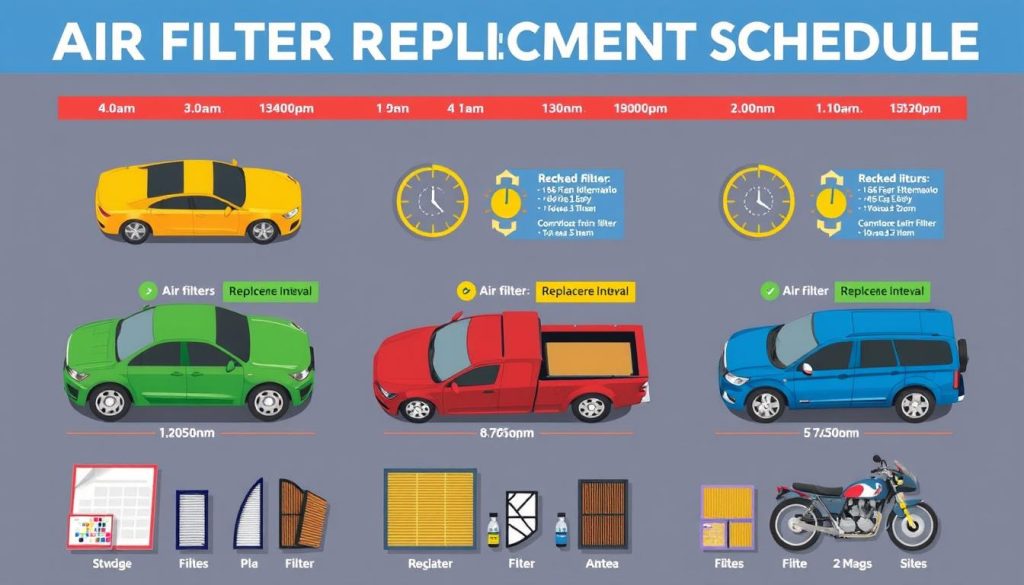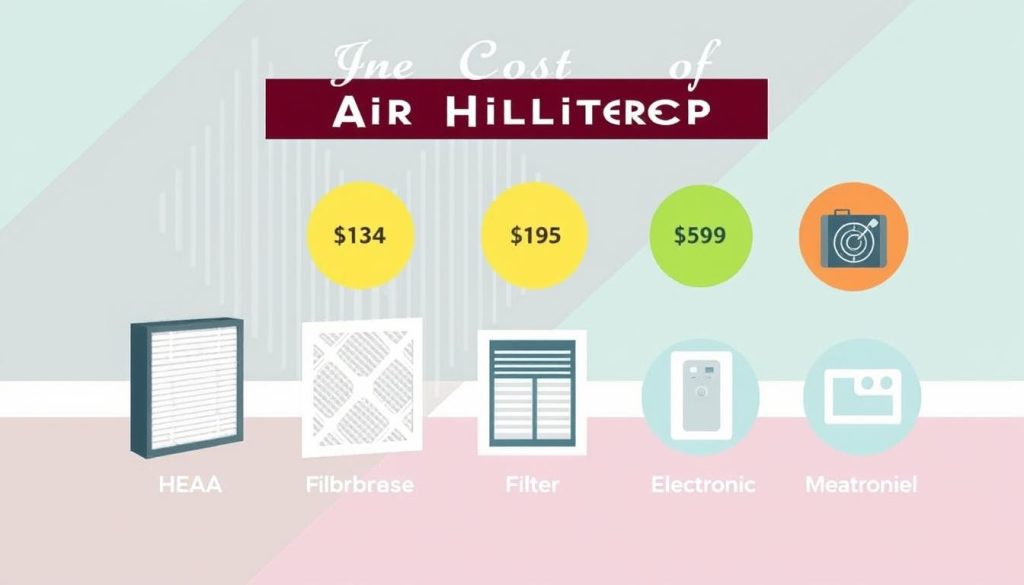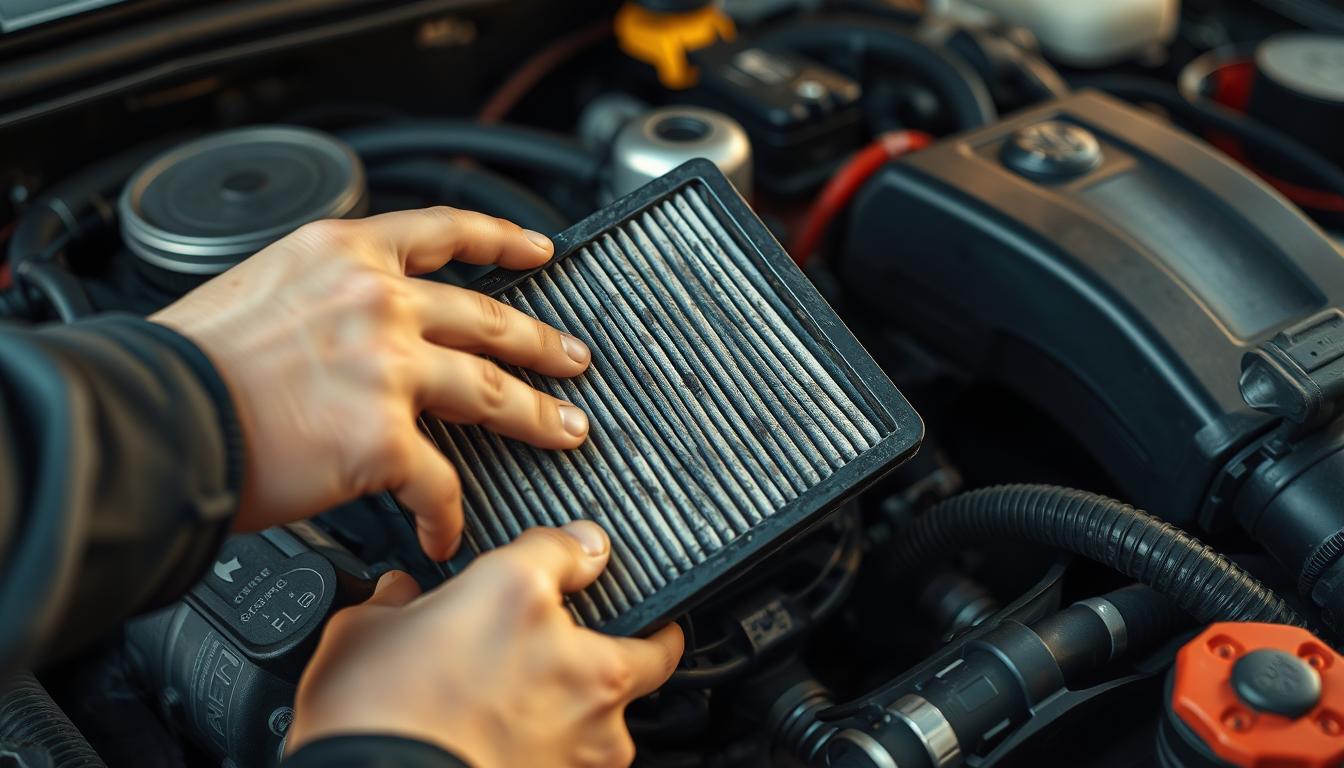Maintaining your car’s engine is critical for peak performance. A fundamental aspect of this maintenance is the timely replacement of the air filter. This component is vital for your vehicle’s health and efficiency.
The frequency of air filter replacement is influenced by various factors. By grasping these, you can ensure your engine inhales clean air. This not only boosts fuel efficiency but also extends the engine’s lifespan. Let’s explore the significance of regular air filter changes for your car’s well-being.
Key Takeaways
- Regular air filter changes are essential for car engine maintenance
- Proper replacement intervals improve vehicle performance
- Air filter lifespan depends on driving conditions and environment
- Timely changes enhance fuel efficiency and engine longevity
- Understanding your car’s needs helps determine ideal replacement frequency
Understanding the Importance of Air Filters in Your Car Engine
Your car’s engine requires clean air to function optimally. Engine air filtration is essential for maintaining your vehicle’s performance. We will examine the role of air filters in engine efficiency.
What Does an Air Filter Do?
An air filter serves as a protective barrier, capturing dust, debris, and other contaminants before they reach your engine. This component is vital for safeguarding engine parts from damage and wear.
Types of Air Filters Available
There are various filter types, each with distinct features:
- Paper filters: Economical and commonly used
- Cotton filters: Reusable and offer high performance
- Foam filters: Suitable for off-road vehicles
| Filter Type | Lifespan | Cost | Filtration Efficiency |
|---|---|---|---|
| Paper | 15,000-30,000 miles | Low | Good |
| Cotton | 50,000+ miles | High | Excellent |
| Foam | 20,000-40,000 miles | Medium | Very Good |
Impact on Engine Performance
A clean air filter enhances engine efficiency significantly. It ensures better airflow, leading to improved fuel economy and power output. Regular air filter maintenance promotes smoother engine operation and extends its lifespan.
“A well-maintained air filter can improve fuel efficiency by up to 10%, saving you money at the pump while reducing emissions.”
Signs Your Air Filter Needs Replacement
Identifying the signs of a dirty air filter is vital for your vehicle’s well-being. A clogged filter can cause a myriad of engine performance problems, affecting your car’s efficiency and lifespan.
One clear indicator is a noticeable reduction in fuel economy. If you’re finding yourself at the pump more often, it’s time to inspect your air filter. A dirty filter compels the engine to exert more effort, leading to increased fuel consumption.
Engine performance issues often manifest when the air filter is clogged. You might encounter:
- Sluggish acceleration
- Rough idling
- Unusual engine sounds
- Misfiring or vibrating engine
Regular checks can help identify these problems early on. If you observe black smoke from the exhaust or a check engine light, it’s a clear warning. These signs suggest a severely clogged air filter, disrupting the engine’s air-fuel mixture.
“A clean air filter is like letting your engine breathe fresh air. It’s essential for optimal performance and longevity.”
By being proactive and addressing these symptoms promptly, you can avert more severe engine problems. Remember, a simple air filter replacement can significantly enhance your car’s efficiency and power.
Recommended Replacement Intervals by Vehicle Type
The air filter replacement schedule for your vehicle is contingent upon its type. Manufacturer guidelines vary, yet understanding general principles aids in planning maintenance specific to your vehicle.
Passenger Cars and SUVs
Typically, passenger vehicles require air filter replacements every 15,000 to 30,000 miles. This timeframe can fluctuate based on driving conditions. Urban drivers, for instance, may need more frequent replacements due to higher pollutant levels.

Commercial Vehicles
Commercial vehicles necessitate more frequent air filter replacements. Their heavy-duty nature and exposure to diverse environments accelerate filter clogging. Fleet managers often opt for replacements every 10,000 to 15,000 miles.
High-Performance Vehicles
High-performance cars require special consideration. Their powerful engines necessitate clean air for peak performance. Owners of such vehicles should inspect their air filters every 10,000 miles and replace them as necessary.
| Vehicle Type | Recommended Replacement Interval (Miles) |
|---|---|
| Passenger Cars/SUVs | 15,000 – 30,000 |
| Commercial Vehicles | 10,000 – 15,000 |
| High-Performance Vehicles | Check at 10,000, replace as needed |
It’s important to note that these are general guidelines. Always refer to your vehicle’s manual for specific manufacturer recommendations. Regular inspections and timely replacements ensure your engine operates efficiently and at its peak performance.
Environmental Factors Affecting Air Filter Lifespan
Your car’s air filter encounters various challenges based on driving conditions. These elements significantly influence both filter longevity and air quality. Let’s examine how different driving scenarios impact your air filter’s lifespan.
Urban vs. Rural Driving Conditions
In urban settings, your air filter is exposed to a higher concentration of pollutants. This includes exhaust fumes and industrial emissions, which can rapidly clog the filter. On the other hand, rural areas present a different challenge with increased levels of dust and pollen. These particles also contribute to the filter’s premature deterioration.
Climate and Weather Impact
The weather significantly influences the lifespan of your air filter. In humid climates, moisture can become trapped in the filter, potentially leading to mold growth. Dry, hot environments, conversely, see an uptick in dust levels. Cold climates may necessitate more frequent oil changes, indirectly affecting the air filter’s longevity.
| Climate | Impact on Air Filter |
|---|---|
| Humid | Moisture buildup, possible mold |
| Dry | Increased dust accumulation |
| Cold | More frequent maintenance required |
Construction Areas and Dusty Regions
Driving through construction zones or dusty regions can rapidly clog your air filter. These environments are teeming with airborne particles that your filter must capture. If you frequently traverse such areas, expect to replace your filter more frequently to maintain optimal air quality and engine performance.
Grasping these environmental factors aids in determining the appropriate time for air filter checks and replacements. Regular inspections are essential to ensure your engine receives clean air, regardless of your driving conditions.
DIY Air Filter Inspection Methods
Regular air filter maintenance is essential for optimal engine performance. Learning visual inspection techniques for your car’s air filter can save you time and money. This guide focuses on air filter checks as part of home car care.
Begin by locating your air filter. It’s typically found in a black rectangular box under the hood. Open the casing with care. Remove the filter and hold it up to a bright light. If light cannot pass through, it’s time for a replacement.
Inspect for visible dirt, debris, or damage. A clean filter should appear white or off-white. Excessive grime indicates it needs changing. Gently tap the filter on a hard surface. If dust clouds form, consider replacing it.
- Look for tears or holes in the filter material
- Check for oil contamination, which appears as dark spots
- Inspect the rubber seal for cracks or wear
Remember, safety is a priority. If unsure about any steps, consult a professional. Some modern cars have complex air intake systems that require expert handling.
| Inspection Method | Frequency | Tools Needed |
|---|---|---|
| Visual Check | Every 3 months | Flashlight |
| Light Test | Every 6 months | Bright light source |
| Tap Test | Every oil change | None |
By mastering these simple visual inspection techniques, you’ll become proficient in air filter maintenance. This essential aspect of home car care ensures your engine breathes clean air, improving its longevity and performance.
Cost Considerations for Air Filter Replacement
Understanding the costs involved in air filter replacement is essential for making informed decisions. We will examine the various aspects of air filter prices and maintenance costs. This will help you maximize your DIY savings.
OEM vs. Aftermarket Filters
Air filter prices differ based on whether you opt for OEM (Original Equipment Manufacturer) or aftermarket options. OEM filters, while more expensive, guarantee a perfect fit and high quality. On the other hand, aftermarket filters are generally cheaper but can offer satisfactory performance at a lower cost.
| Filter Type | Average Price Range | Pros | Cons |
|---|---|---|---|
| OEM | $20 – $60 | Perfect fit, high quality | Higher cost |
| Aftermarket | $10 – $40 | Lower cost, good performance | Varying quality |
Professional Service vs. DIY Installation
The choice between professional service and DIY installation significantly affects maintenance costs. Professional installation ensures proper fitting, while DIY methods can lead to substantial savings.

Long-term Cost Benefits
Regular air filter replacement offers long-term cost advantages. It enhances fuel efficiency, reduces engine wear, and prevents expensive repairs. By investing in timely replacements, you can achieve significant DIY savings over your vehicle’s lifespan.
“Proper air filter maintenance can save you up to 10% on fuel costs annually.”
By considering these factors, you can make cost-effective decisions regarding your vehicle’s air filter maintenance. This balance between upfront costs and long-term savings is key.
Common Mistakes When Changing Air Filters
Changing your car’s air filter might seem simple, but it’s easy to make air filter installation errors. These engine care mistakes can lead to serious problems down the road. Let’s look at some common maintenance pitfalls to avoid.
One frequent mistake is using the wrong filter size. Cars need specific air filters, and using an ill-fitting one can let dirt into your engine. Always double-check your vehicle’s manual for the correct filter size and type.
Another error is improper installation. If the filter isn’t seated correctly, it won’t do its job. Make sure it’s snug in its housing without any gaps. But be careful not to over-tighten – this can damage the filter or its housing.
- Forgetting to clean the air box before installation
- Installing the filter upside down or backwards
- Neglecting to replace the air box cover securely
Some car owners try to save money by cleaning and reusing disposable filters. This is a big no-no. Disposable filters are meant for one-time use. Cleaning them can damage the filter media, reducing its effectiveness.
Lastly, don’t forget to reset your car’s maintenance light after changing the filter. This ensures you’ll get a timely reminder for the next replacement.
“A clean air filter is like clean lungs for your car. Don’t compromise its ability to breathe.”
By avoiding these common air filter mistakes, you’ll keep your engine running smoothly and efficiently for years to come.
Benefits of Regular Air Filter Maintenance
Regular air filter maintenance is essential for optimizing vehicle performance. A clean air filter ensures your engine receives the necessary air, leading to enhanced fuel efficiency and overall performance.
Fuel Efficiency Improvements
A clean air filter facilitates easier breathing for your engine, reducing strain on your vehicle’s systems. This improvement in fuel economy saves you money and promotes eco-friendly driving practices.
Engine Protection
A well-maintained air filter traps harmful particles, protecting your engine from damage. This protection significantly contributes to engine longevity, reducing the need for costly repairs and extending your vehicle’s life.
- Prevents abrasive particles from entering the engine
- Reduces wear on internal components
- Maintains proper air-to-fuel ratio
Environmental Impact
Clean air filters benefit not just your vehicle but also the environment. By optimizing engine performance, they reduce harmful emissions, contributing to cleaner air and a healthier planet.
“A well-maintained air filter is like a breath of fresh air for your engine and the environment.”
Regular air filter maintenance is a simple yet effective way to ensure optimal vehicle performance, extend engine life, and promote eco-friendly driving. By making this small effort, you’re not only taking care of your car but also doing your part for the environment.
Conclusion
Maintaining your car’s air filter is essential for vehicle upkeep. Regular inspections and timely replacements ensure your engine operates efficiently. A clean air filter enhances fuel efficiency and safeguards your engine from pollutants.
It’s vital to frequently check your air filter, more so if you drive in areas with high dust levels or congested city streets. The frequency of air filter replacements varies by vehicle model, so consult your owner’s manual for specific guidance. Replacing a dirty filter is a straightforward way to demonstrate your car’s care and maintain its performance.
Emphasizing air filter maintenance benefits both your vehicle and the environment. A well-kept vehicle consumes less fuel and emits fewer pollutants. When you next open your car’s hood, remember to inspect the air filter. Your car and your wallet will appreciate these simple yet effective engine care practices.

Leave a Reply